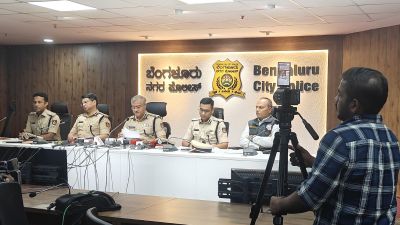Father builds a road for Naxalite son’s surrender
Stop in front of the fortress-like police station on the highway and you will get yelled at by 10 frantic policemen sitting in lookouts. Wel...

Stop in front of the fortress-like police station on the highway and you will get yelled at by 10 frantic policemen sitting in lookouts. Welcome to Naxal country, where the police take no chances. The unwritten rule is that you stop on the opposite side of the road, 50 feet away.
At 9am on Monday, the police were ready for Mada Gangadhar alias Sudhir (22), the number two man of the People’s War Group (PWG) in the district who had a reward of Rs 1 lakh on his head. With his heart pounding in his ears, his father Mada Istary (50) gingerly walked the 22-step-wide wiremesh maze with his rebel son, expecting fire from any one of the several guns trained on them.
He watched his son surrender, without an incident.
Over the last six years, Sudhir’s dalam (group) of five has killed around 20 persons, including six policemen. Dalams are the ground units of the Naxal movement that has thrived in inaccessible villages and jungles and wracked almost all districts of the state for over two decades, killing over 7,000 people.
The Naxal movement, though on the wane, is sputtering to life on the eve of the elections.
Every day, the local newspapers carry reports about an informer who “committed suicide”, a former Naxal shot dead, encounters, threats to candidates, near-misses and combing operations.
Circle Inspector R Bhaskar shows off the latest Most Wanted poster which has Sudhir’s photograph with his hair neatly parted on the side. Six of the 12 faces have either surrendered or been shot dead in encounters. “We have to update it,” he says apologetically.
With a loaded pistol on the table, Bhaskar, over the last two days, has sat with Sudhir in a strawberry pink room to fill over 60 sheets of information.
The father and son come to the police station every morning and leave for their village Vaghdari in the evening. No handcuffs, no prison. In fact, the government has a rehab package ready for Sudhir—the reward of Rs 1 lakh and a plot 35X40 sq. m in whichever town he wants.
|
Fields of Death
|
||
|
Story continues below this ad |
||
On Wednesday afternoon, Sudhir is sitting on the bench and literally singing like a canary. It’s a Naxal song in Telugu that influenced him a lot in his growing years.
In one breath, his voice rises and his eyes shut as he sings of society’s loopholes, casteism, of such a big country with so many resources, and the reason why there are so many poor people was because the big people were taking away their money.
By the time the lyrical song ends, everybody in the room has goosebumps. ‘‘I went to them because they would come to our village and were really nice to me. I dropped out after Class VIII. There were all these songs that would help me think beyond the sadness in the house,’’ says Sudhir.
He was also fascinated with guns. The inspector takes out the magazine from his revolver and gives it to Sudhir. He snaps back the catch and takes aim in one smooth movement. ‘‘We got arms training for six months in the jungles.’’ He points to Lachchama’s face on the wanted poster. ‘‘I met him in 2000.’’ He is the man who blasted CM Naidu’s car last year. Even the inspector is impressed.
There were many fights in the village, admits his father. ‘‘He left at the end of one such fight. It was over marbles. He was just 16.’’
Vaghdari is around 5 km down the highway past several lazy hairpin bends. It’s located near Kuntala, where the water of Kadam river spectacularly falls 45 metres.
From the highway, a smaller road branches off for Vaghdari. The Naxal’s father has personally lifted earth 12 hours a day to build this 4 km road that lnks the village to civilization and the police, effectively striking it off the route of the Naxals. ‘‘It has transformed our lives,’’ he says with pride.
He is lucky, Naxals’ favourite target is setting fire to roadrollers and tankers.
Earlier, they would carry everything from water to fertilizer for miles. Istary owns six acres where there is very little water, which he contracts out for cotton and soyabean.
As a child and teenager, Sudhir saw days of hunger, no medical treatment for those who fell ill, and little hope after he dropped out of school. He did not see a future in the mill his father had set up for him.
Istary’s house is made of mud packed on beams of teak. There is a taperecorder in a corner, where Sudhir heard the songs that transported him into the Naxals’ world of justice, hero worship and the good life, a life where the current government would be overthrown and the PWG would rule and bring equality among the rich and the poor. Mother Mada Laxmi(40), with a shower of pearls in her ears, says her first-born, though pampered, was a bit eccentric. ‘‘The song got to him. After he left, the father took to drinking, fell and broke his arm. I started rolling bidis and fell ill with typhoid. I was in depression. We left messages in villages all over. I met him once in the jungles, when he was shot at. The police told us after a surrendered Naxal told them.’’ Sudhir had shown off a big splat of pale flesh where a bullet had grazed him on the back.
They recently got the house through a government scheme. After the house and a road, Istary swears by the government now. Sudhir’s younger brother Sudhakar (20) is in college. Gangamani (18) has been married off. ‘‘I did not think he would get back alive,’’ Laxmi weeps. Mada Istary says he has placed 15 statements in Eenadu (it doesn’t cost much) pleading with Sudhir to come back as his mother was not well.
Meanwhile, Sudhir saw the Naxals’ numbers dwindle. His own dalam was down to five in place of 10. ‘‘There were 150 dalams, now there are only 24,” Sudhir had told the inspector.
There was no money. “I didn’t earn anything, it all went to the higher-ups. All they gave us was food, clothes and bullet wounds.”
It took him six years to snap out of it. He returned on Sunday and the father went to the police station, uncertain whether the government’s surrender scheme works. It did.
He isn’t sure and not really bothered about the rehab package. ‘‘Others haven’t got it. For now, I just want my son to settle into a normal life. If we do get the money, we’ll buy an auto and move to Neridikonda.” It’s a small town some 30 km down the highway. If the father’s plan works, in a couple of years you may just find Sudhir ferrying passengers on the highway.



- 01
- 02
- 03
- 04
- 05




























